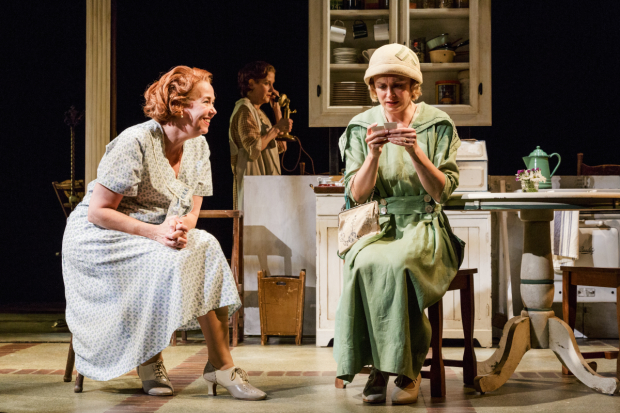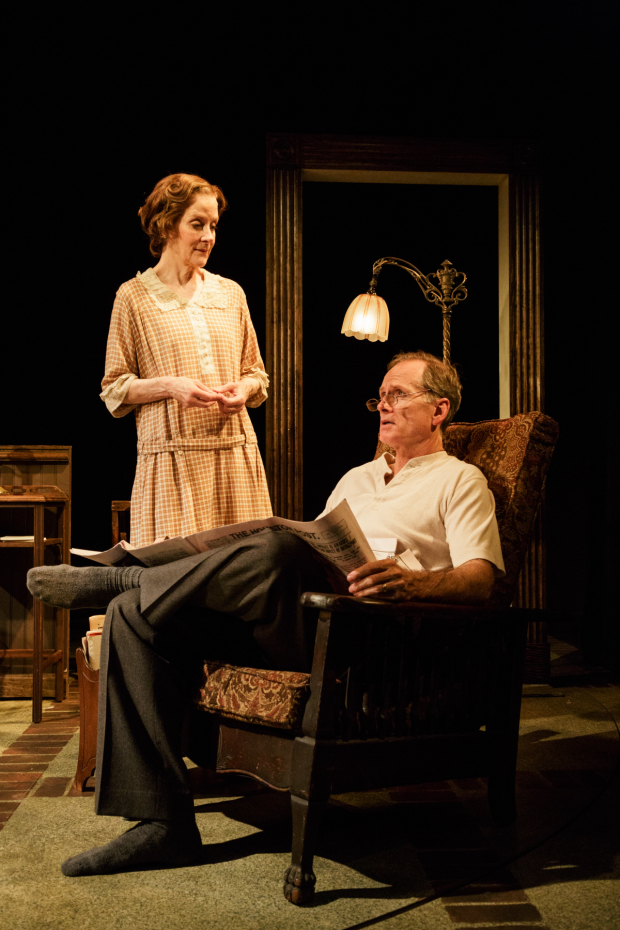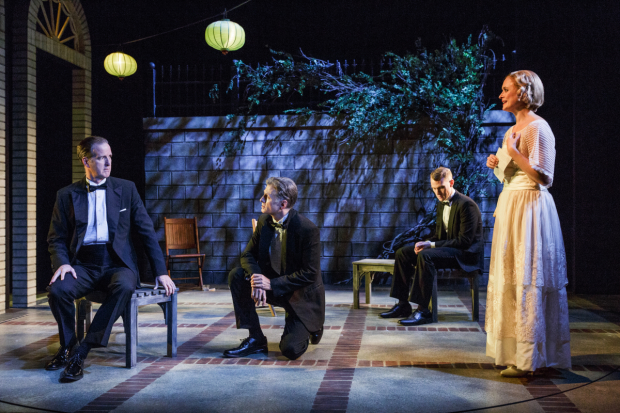
(© James Leynse)
The opening moments of Primary Stages' off-Broadway revival of Horton Foote's The Roads to Home (playing at the Cherry Lane Theatre) look like an old movie: A scene title flickers across the curtain as the music swells. It's an apt introduction to this sepia-toned portrait of a thriving Texas in the early part of the 20th century. Under the sensitive direction of Michael Wilson (who helmed Foote's The Orphans' Home Cycle in 2009), the production is gorgeously designed and beautifully acted as the drama maintains a constant low boil.
The three-act play (which first appeared off-off-Broadway in 1982) is really more like three interlocking one-acts: Each has its own title and each could stand on its own, even though all are enriched by mutual proximity. The first act ("A Nightingale") introduces us to Mabel Votaugh (Hallie Foote) and Vonnie Hayhurst (Harriet Harris), real housewives of Houston circa 1924. They gossip about Annie Gayle Long (Rebecca Brooksher), the daughter of a wealthy banker from Mabel's hometown of Harrison (the capital of Foote's expanded play world), who watched as her father was assassinated by an angry customer. When Annie shows up for a visit, it is clear she is unwell: "Pow Pow Pow," she screams, pointing her hand like a gun as Mabel and Vonnie, consummate Southern ladies that they are, do their best to ignore the outburst.

(© James Leynse)
Act 2 ("The Dearest of Friends") takes us deeper into Mabel and Vonnie's friendship as Vonnie reveals that her husband, Eddie (Matt Sullivan), is having an affair. The two circle around the telephone and think about making a late-night call to the other woman. All the while, Mabel's husband, Jack (Devon Abner), dozes in his armchair, too exhausted to even engage.
Following the intermission, Act 3 ("Spring Dance") imagines Annie at a never-ending cotillion at a ritzy Austin insane asylum (all the patients have lovely formalwear, compliments of costume designer David C. Woolard). As Annie's fellow convalescents contradict themselves, we cannot tell if Annie is the source of misunderstanding or they are. Perhaps it is both. Either way, it is a frightening feeling that takes us right to the heart of her anxiety.
Foote's portrayal of mental illness isn't particularly nuanced or sophisticated: The characters in the final act feel more like symbols of the unreliability of time and memory than actual human beings. Their implacable Southern gentility keeps us from better understanding their individual conditions (everyone describes themselves as "nervous"). It's as if Jean-Paul Sartre decided to pen a sequel to A Streetcar Named Desire — Blanche: The Later Years.

(© James Leynse)
Still, Wilson and his cast are able to find real emotional depth in these occasionally absurd sketches. Brooksher is particularly moving in her scene with Dan Bittner (who sensitively plays Annie's husband). He expresses his frustration with her daily adventures through the city's streetcar system and she becomes genuinely upset: She doesn't mean to make him angry and she doesn't understand why she's doing it. One feels the need to protect her at this moment.
The whole production benefits from these excellent performances. Harris once again proves to be a master of comedy grounded in real and often tragic circumstances. Wearing a modest house dress, Foote (daughter of the playwright) is the most natural inhabitant of this faded world as she shuffles from one end of the kitchen to the other to pour a glass of water from a large pitcher.
Jeff Cowie's turntable set (which facilitates the smooth transition from Act 1 to Act 2) is decorated with wooden furniture padded by the thinnest of cushions. They are the kind of items one might see in a very elderly relative's home, purchased in a time when upholstery was an inaccessible luxury. David Lander's lighting in the second act is especially beautiful, an incandescent vision of a middle-aged couple's weary Thursday evening. The outside world intrudes through John Gromada's subtle sound design: We hear the ominous whistle of a passing train, taking Texans from place to place with unprecedented speed and reliability. Foote nods at the inevitable social transformation this mobility will bring by making the adulterous Eddie a railroad employee.
Theatergoers who live for sharp-tongued exchanges and explosive confrontations are likely to be underwhelmed by Foote's quietly tragic drama. But if you take the time to slow down and really listen, you're likely to find a vibrant epic within the subtext of The Roads to Home, a snapshot of a bygone age that still reflects our present condition.











